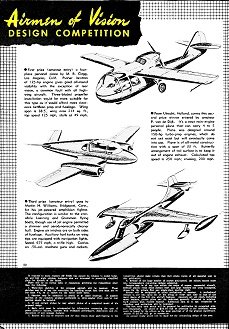|
When Air Trails magazine
was running these airplane design contests in the 1940s and 1950s, the world was
fascinated with the concept of flight. Revolutionary airplanes like the Douglas
DC−3, introduced in the 1930s, opened up the skyways to middle class citizens, and
a plethora of surplus World War I biplanes made learning to fly affordable.
Great advances were made in aircraft design and manufacturing during World War II,
and those lessons were rapidly being applied to civilian aircraft to make flying
accessible to average people. Model aviation was also a huge interest to the young
and old alike. Static display models, simple free flight gliders and propeller driven
models, control line models with screaming internal combustion engines (ICE) were
the passions of hundreds of thousands - maybe millions. Most enthusiasts built models
from kits or plans, but others preferred to design and build their own models. They
were the visionaries who traditionally became the next generation of full-size aircraft
designers and builders. These sorts of contests helped keep the pipeline full. The
$25 top prize in 1949 is the equivalent of about
$330 in 2024 money.
Airmen of Vision Design Competition
 • First prize (amateur entry) a four-place
personal plane by M, R, Clegg, Los Angeles, California. Pusher location of 125-hp
engine gives good all-round visibility with the exception of rear vision, a common
fault with all high-wing aircraft. Three-bladed propeller installation would be
more suitable for this type as it would afford more clearance between prop and fuselage,
Wing span is 38.5', wing area 214 sq. ft., top speed 125 mph, stalls at 49 mph. • First prize (amateur entry) a four-place
personal plane by M, R, Clegg, Los Angeles, California. Pusher location of 125-hp
engine gives good all-round visibility with the exception of rear vision, a common
fault with all high-wing aircraft. Three-bladed propeller installation would be
more suitable for this type as it would afford more clearance between prop and fuselage,
Wing span is 38.5', wing area 214 sq. ft., top speed 125 mph, stalls at 49 mph.
• From Utrecht, Holland, comes this second prize winner entered by amateur P.
van de Dijk. It's a neat twin-engine personal plane that can carry 4 to 5 people.
Plane was designed around 150-hp turbo-prop engines, which do not yet exist but
will eventually come into use, Plane is of all-metal construction with a span of
33 ft. Butterfly arrangement of tail surface is to keep it out of engine exhaust.
Calculated top speed is 250 mph; cruising, 200 mph.
• Third prize (amateur entry) goes to Martin H. Williams, Bridgeport, Conn.,
for his, jet-powered amphibian fighter, The configuration is similar to the erstwhile
Loeininq and Grumman flying boats, though use of jet engine permitted a slimmer
and aerodynamically cleaner hull. Engine air intakes are on both sides of fuselage.
Auxiliary fuel tanks on wing tips are equipped with navigation lights. Speed, 675
mph, a trifle high. Carries six .50-cal. machine guns and rockets.
In response to many requests Air Trails has opened its columns to model builders
and full scale airplane designers who are interested in presenting simplified plans
for aircraft of the future.
There will be no formal rules or regulations governing the competition other
than the following:
1. Three-view sketches of the proposed aircraft will be required. These sketches
may be of any size convenient for handling except that they must be less than 8
1/2 by 11 inches for the entire three views.
2. Sketches may be submitted in pencil or as inked drawings. If possible sketches
of the complete airplane preferably in three-quarter front and/or rear position
should be included.
3. If any entrant wishes he may submit photos of a completed model of his proposed
entry.
4. Each entry must be accompanied by information concerning the type of power
plant (s) utilized, together with estimated performance, dimensions and explanations
of any unusual features.
5. Entries will not be returned and for that reason those participating in the
competition should make certain that they retain copies of all material sent to
this publication.
6. Because of the large number of entries anticipated, the editors cannot enter
into correspondence concerning designs submitted.
Designs may be of any type within the realm of reason: commercial aircraft, military
planes - both small pursuit craft and large bombers and troop transports, planes
for the private flyer and single-place sporting craft.
Entries will be designated as either professional or amateur. A professional
entrant is one who earns his or her living or works part time in any of the many
places of the full size aircraft business. Amateurs are all others including model
builders, private pilots and the individual generally interested in aviation. Each
entrant must classify himself. Additional data as to age, occupation or schooling,
and aspirations will be welcomed.
The best entry each month will be prepared for publication by recognized aviation
illustrators. An award of $25.00 will be presented to the individual whose entry
is judged by the editors as the most practical or of the greatest significance.
Awards of $5.00 will go to runners-up.
An annual trophy award will be made for the outstanding design of the year.
Posted May 25, 2024
|



